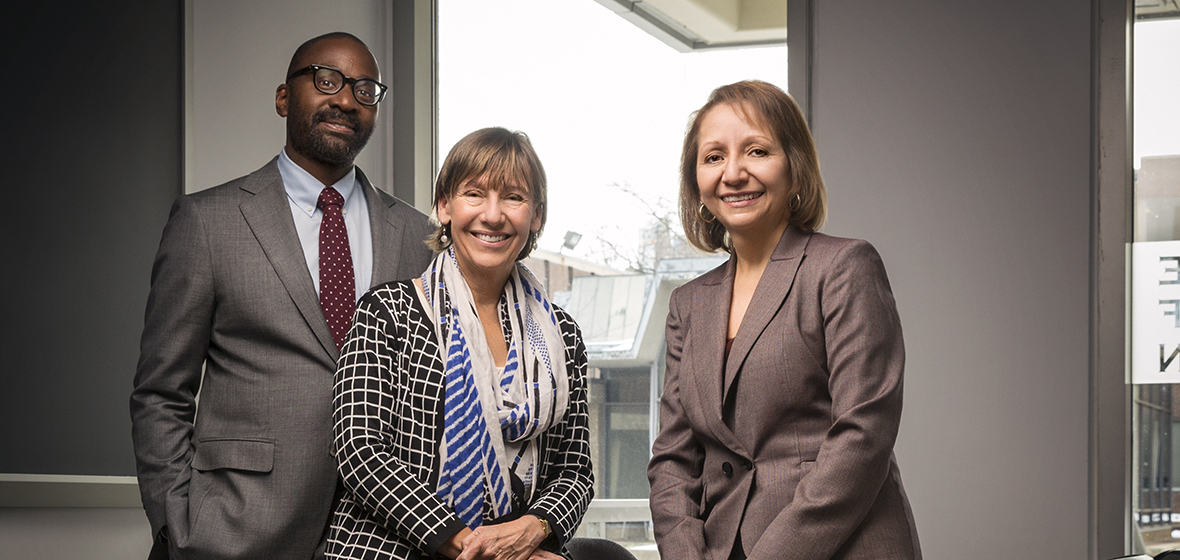News Details
Penn Futures Project: Investing in Children & Communities

Authored by: Penn School of Social Policy & Practice, Graduate School of Education, and Nursing
Photography by: Stuart Goldenberg
Faculty & Research
02/16/16
The School of Social Policy & Practice joins Penn GSE and Nursing to form unique collaboration, awards grants to improve health and well-being of youth and families in Philadelphia and beyond
Three University of Pennsylvania deans have joined forces to improve the lives of Philadelphia youth and families through the Penn Futures Project (PFP). Penn Nursing Dean Antonia Villarruel, Social Policy & Practice (SP2) Dean John L. Jackson, Jr., and Graduate School of Education (GSE) Dean Pam Grossman announced today that they are investing $30,000 to launch cross-school pilot projects aimed at working in partnership with communities to improve the lives of children and families. Vincent Price, Provost of the University of Pennsylvania, agreed to match the contribution, making a total of $60,000 available for PFP work. The selected projects will focus on forging a partnership with a local high school for health sciences to prepare professionals who work with youth and support cross-professional and cross-sector collaboration, harnessing the power of cross-city agency data to create new solutions for children in poverty, and preparing practitioners to work with vulnerable LGBTQ youth.
The idea for the joint effort sprang from the common interests of three new deans joining Penn for the 2014–2015 academic year. The Nursing, SP2, and GSE deans quickly identified a common passion for improving the health and well-being of children and families. In the fall of 2015, these deans asked faculty members from across their schools to come together for a meeting to share the work they were doing in the community – over 50 Penn faculty attended. They were invited to find commonalities across schools, initiate cross-school collaborations, and create high-impact funding proposals for the deans. Three of these proposals were chosen for inaugural grants.
“The challenges facing our community cannot be solved by any one discipline, school, health system, or community,” said SP2 Dean Jackson, a Richard Perry University Professor. “It’s for this reason that we have partnered to work across Penn and across Philadelphia’s landscape of community organizations, local businesses, government agencies, and other entities to develop innovative, multi-disciplinary solutions to some of the most pressing problems. I am excited to see the social change we can bring about by combining our energy, expertise, and passion.”
“We are committed to finding ways to work with community members and other professionals to create greater opportunity for all of our children,” said GSE Dean Pam Grossman. “The challenges facing our youth go well beyond the schoolhouse, and these projects represent a unique opportunity to leverage the collective wisdom of the Penn community and beyond to invest in children and communities. Cross-professional collaborations promise to better prepare GSE, SP2, and Nursing students to work together on behalf of children and families.”
“Health is shaped not only by genetics and behavior, but also by access to healthcare and opportunities for healthy choices, which are largely a function of socioeconomic factors, including neighborhood environments, income, education, and social support,” said Penn Nursing Dean Antonia Villarruel. “We must address issues comprehensively by looking across these factors and investing in solutions that will make Philadelphia a healthier, safer, and more equitable city for our youth.”
The 2016 Penn Futures Projects are:
Penn Graduate School Alliance for Field Practice with Kensington Sciences Academy (KHSA) brings the three Penn Futures Project schools (Nursing, GSE, and SP2) together to develop a Penn Graduate School Alliance for Field Practice at KHSA, a Philadelphia health science public school located in one of America’s most under-served neighborhoods. Understanding that developing practitioners to serve the needs of a community in poverty requires the expertise of multiple disciplines, this collaboration aims to serve as an innovative model for a partnership between a university and an urban school district for the purpose of developing and supporting a “whole child/community” model of professional learning.
Serving LGBTQ Youth and Families: Preparing the Next Generation of Social Workers, Teachers, School Counselors, and Nurses – To better serve LGBTQ youth and their families – particularly transgendered youth of color – there is a pressing need to expand training opportunities and curriculum content for the next generation of social workers, teachers, school counselors, and nurses. Faculty, students, and alumni from SP2, GSE, and Nursing will work with partners from CHOP and The Attic Youth Center. Together, they will review classroom and field learning opportunities for Penn graduate students, with the intent of preparing the next generation of clinical and educational professionals to better serve this vulnerable population. The collaborators will propose – and, where possible, implement – changes in the content of existing courses and the creation of new courses. Field training options will be expanded, and LGBTQ youth will be directly engaged in their work.
A Penn Interdisciplinary Contribution to Data-based Decision-Making in Philadelphia – The opportunities for Integrated Data Systems (IDSs), which can make government more efficient through cross-system collaboration, are just beginning to be understood. IDSs can link individual administrative records across public agencies to provide an unprecedented and nuanced snapshot of the effects of poverty on children’s lives – and how factors such as homelessness or low birth weight might impact their outcomes. Expanding on previous work, this project draws together researchers from GSE, SP2, Nursing to support the City of Philadelphia’s integrated data system in the Deputy Mayor’s Office for Health and Opportunity. This project will look across City systems and agencies to identify young children who are high-cost service recipients – and create a model that can be used to improve service delivery and inform intervention building. This work holds great promise for Philadelphia’s children – and may be a role model for cities nationwide.
Each of the winning projects is expected to commence in spring 2016.